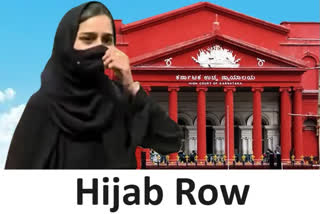Bengaluru:The hearing of a batch of petitions in the ongoing Hijab ban row, which is being heard by a three-member bench of Karnataka High Court, entered its third day today. The full bench comprising Chief Justice Ritu Raj Awasthi and Justices Krishna S Dixit and JM Khazi, which is hearing the related petitions, had, on February 10, barred the wearing of hijab, saffron shawls, scarves in school until the final directions from the court. In its interim order, the court had also directed the state government to reopen educational institutions.
Resuming his argument on behalf of the petitioners, Senior Advocate Devadatt Kamat spoke about the essence of Article 25 and how it protected the practice of faith "but not a mere display of religious identity or jingoism".
He urged the bench to make some leeway for the students and permit them to wear the headscarf in addition to uniform while the hearing is going on. The counsel asked the court to reconsider its previous verbal order in which it had forbidden wearing of hijab or saffron scarves in schools till the hearing of the matter. Kamat submitted that the Education Act had "no provision to expel a student for not adhering to uniform". "If you are expelled for an extra attire, doctrine of proportionality will come in," Kamat submitted.
"This is an innocuous practice of wearing a headscarf and not changing my uniform. This is a facet of freedom of speech and expression. If small exemption is given to wear a headscarf, it will be in line with the right to freedom of speech and expression," he said. The Constitution, Kamat said, provides positive secularism and all faiths have to be recognised.
Kamat cited a 2004 case of Sunali Pillay vs Durban Girls High School case in South Africa. The school, he said, had said that girls should not be allowed to wear the “nose adornment” as it would interfere with codes of conduct at the school. However, the petitioner had claimed that it was her constitutional right.
"The judgement said this is not about uniforms. It is about whether certain people should be exempted from certain rigours of uniform. This [hijab] is not even an exemption. It's only an addition. "The possibility for abuse should not affect the rights of those who hold sincere beliefs," Advocate Kamat said quoting from the South Africa judgment.
On Monday, Kamat had argued that the government can’t deny fundamental rights to students in the pretext of managing law and order situations. He also objected to the powers given to the College Development Committee to decide on uniforms. Making the same argument today, Kamat asked the court for an interim relief that would allow Hijab-wearing students into schools and colleges, and with that, he concluded his argument.
Next was the turn of Senior Advocate Professor Ravivarma Kumar to argue on behalf of the petitioners. He argued that the GO does not prohibit wearing of the Hijab, so the students are not violating "any public order, equality or unity". He asked the court to take note of the "fact that there is no ban of wearing hijab by any student much less by the religious minority community. GO says CDC will prescribe it".
Explaining further, Kumar argued that while "Education Act is a complete code," CDC is an extra-legal authority, which has now been "endowed with power to prescribe uniform" which is contrary to the "scheme of the act and letter of the rules". CDC is not an authority under the Education Act, said the senior advocate, while asking the Justices to consider the affidavit he filed because colleges are set to reopen on Wednesday. However, Chief Justice denied it because it was not filed by a party but by the counsel. The hearing ended with the bench rejecting the affidavit filed by the advocate and it is set to resume tomorrow at 2:30 pm.
On Monday, the bench had also refused to restrain media from reporting the proceedings as one of the counsel demanded that it will have an effect on the elections of other states. The court had earlier given an interim order that no religious symbols are allowed for the students in schools and colleges until the final court. The order banned both hijab and saffron shawls in the school and college premises.
The larger bench also set aside the arguments of petitioners seeking orders to the government for allowing students to wear hijab of the colour of their uniform to classrooms. However, petitioners moved the Supreme Court challenging the interim order banning hijab in classrooms. The state government has resumed classes till standard 10 and Pre-University Colleges are opening from Wednesday.
READ:Hijab row not a controversy, but conspiracy against India: BJP
